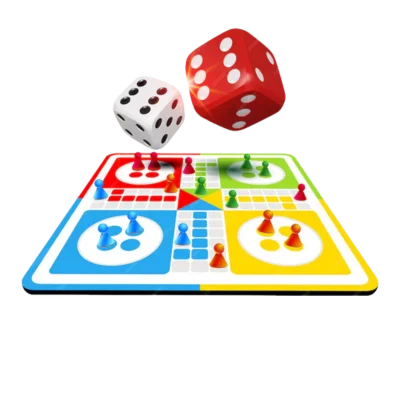Introduction
Ludo is no longer just a traditional board game—it has transformed into a global online multiplayer experience. One of the biggest reasons for its success is the integration of social features, which enhance player engagement, retention, and competition. Adding features like real-time chat, leaderboards, friend invites, social media sharing, and community-driven tournaments can make Ludo games more interactive, enjoyable, and competitive. This blog explores the key social features that enhance player interaction, how they improve engagement, and why they are crucial for the success of modern Ludo games.

1. The Importance of Social Features in Ludo Games
Ludo games thrive on player interaction and engagement.
Adding social elements allows players to:- Connect with Friends & Family – Encourage multiplayer engagement.
- Compete & Stay Motivated – Leaderboards and achievements add excitement.
- Build a Community – Social gaming leads to a loyal player base.
- Enhance Retention – Players return more frequently when they can interact.
2. Must-Have Social Features for Ludo Games

2.1 Real-Time Chat & Emojis for Interactive Gameplay
- Text Chat: Allows players to communicate during matches.
- Voice Chat: Provides a more immersive experience for multiplayer games.
- Emojis & Reactions: Enables players to express themselves with stickers and GIFs.
Why It’s Important:
- Boosts social engagement and creates a competitive atmosphere.
- Helps players strategize in team-based Ludo formats.
Example: Real-time chat increases session length by 40% as players engage with each other while playing.
2.2 Friend Invites & Multiplayer Matchmaking
- Friend Code System: Players can add and invite friends easily.
- Social Media Integration: Allows users to share invites on Facebook, WhatsApp, Instagram, and Twitter.
- Quick Matchmaking: Auto-connects players with similar skill levels.
Why It’s Important:
- Helps retain players longer by keeping them engaged with friends.
- Increases organic game growth through social referrals.
Example: Games with referral-based friend invites see a 3x higher retention rate than games without it.
2.3 Leaderboards & Achievements for Competitive Play
- Global & Regional Leaderboards: Displays top players based on wins and scores.
- Daily & Weekly Challenges: Players complete objectives to earn points.
- Achievements & Badges: Unlockable rewards for milestones (e.g., “Played 100 Matches”).
Why It’s Important:
- Encourages healthy competition and player motivation.
- Increases daily engagement as players strive to rank higher.
Example: A game with a monthly ranking leaderboard saw a 60% boost in player retention.
2.4 Social Media Sharing & Streaming Integration
- Game Clip Sharing: Players can record and share game highlights.
- Live Streaming Support: Connects Ludo games with YouTube Live, Twitch, and Facebook Gaming.
- Social Media Challenges: Players compete for rewards by sharing gameplay.
Why It’s Important:
- Drives free marketing & viral growth through social platforms.
- Attracts new users who see shared content from friends.
Example: Ludo game players who share wins on social media bring in 5-10 new players per post.
2.5 Guilds, Clubs, and Community-Based Features
- Team Play & Guilds: Players can form groups, play together, and win collective rewards.
- In-Game Communities: Enables discussion forums and strategy sharing.
- Exclusive Club Events: VIP members participate in special tournaments and challenges.
Why It’s Important:
- Fosters long-term engagement as players develop team loyalty.
- Increases in-game purchases as teams compete for premium rewards.
Example: Games with clan-based competitions see 70% higher engagement than solo-play games.
3. Monetizing Social Features in Ludo Games

3.1 VIP Subscriptions & Premium Social Features
- Ad-Free Social Play: Players can chat and invite friends without interruptions.
- Exclusive Emojis & Reactions: Unlock special animations.
- Premium Leaderboards: Compete in VIP-only rankings.
Example: A VIP $4.99/month subscription for premium chat features boosts revenue by 15% per user.
3.2 Social Referrals & Friend-Based Rewards
- Players get bonus coins or in-game rewards when they invite friends.
- Referral leaderboards reward top referrers with exclusive skins or features.
Example: Games with friend-based referrals see a 5x increase in daily active users (DAU).
3.3 Community-Driven In-App Purchases
- Guild Skins & Avatars: Teams can buy custom icons and branded merchandise.
- Sponsored Tournaments: Players pay to enter high-reward community competitions.
Example: 50% of in-game purchases come from players active in gaming communities.
4. Future Trends in Social Gaming for Ludo
4.1 AI-Powered Social Features
- AI-based chat moderation & toxicity detection.
- Smart matchmaking with players sharing similar social interests.
4.2 Web3 & Blockchain-Based Social Gaming
- Decentralized Ludo communities with NFT-based avatars.
- Earn rewards for social engagement using play-to-earn (P2E) models.
Unlock Success with Expert Ludo Game Development Consultancy

Conclusion
Integrating social features in Ludo games enhances engagement, boosts player retention, and drives organic growth. By adding real-time chat, leaderboards, friend invites, and community-driven events, developers can create a thriving player base with long-term profitability. With AI-driven interactions, Web3 innovations, and gamified social networking, the future of social Ludo gaming is more interactive than ever. Best Ludo game development in 2025 is leading the way in creating these immersive, socially-driven experiences.



